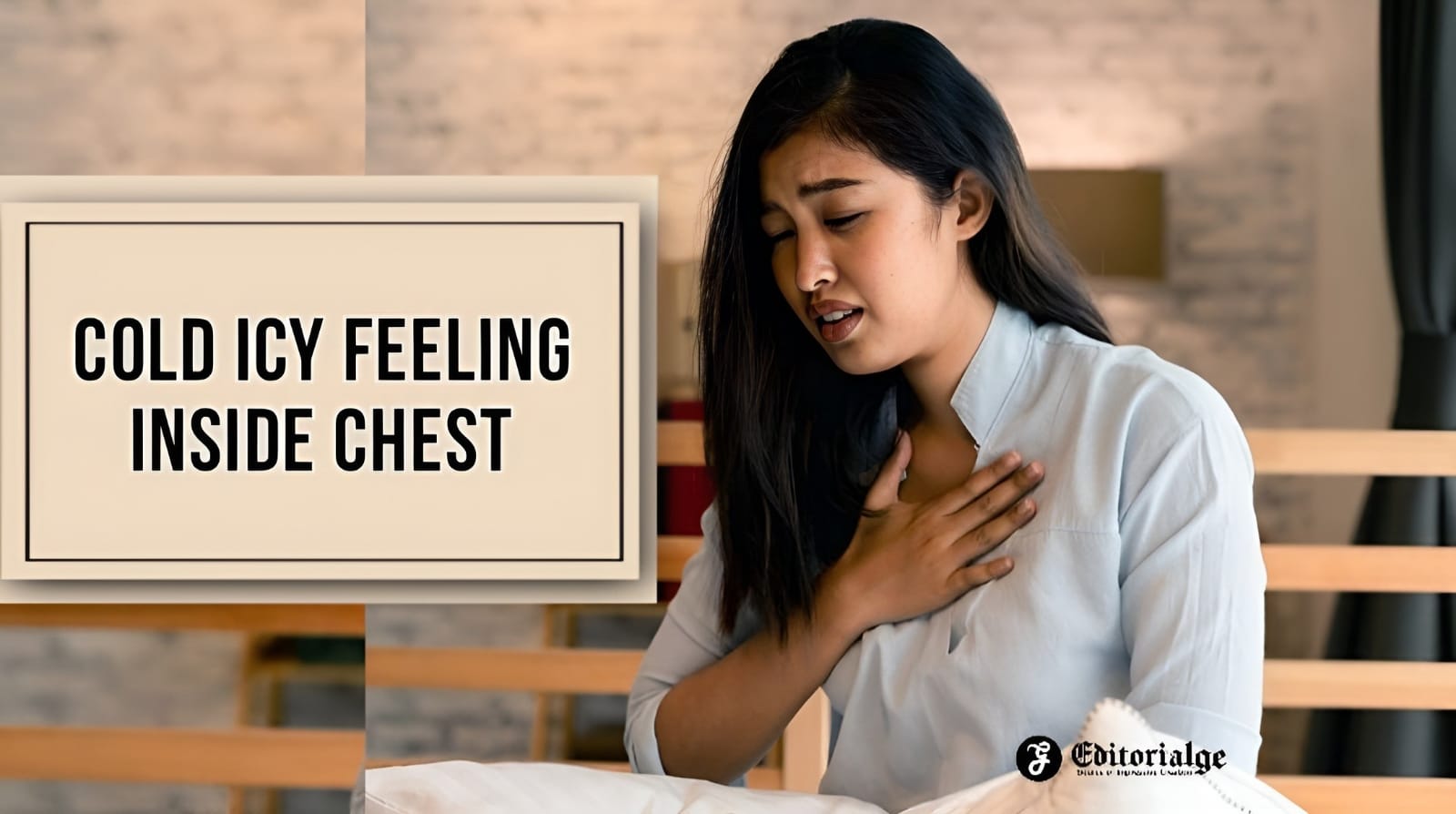Listen to the Podcast:
People frequently encounter and consider a cold icy feeling inside chest, a frosty sensation in the chest. Nevertheless, what if it indicates a serious problem? A cold sensation in the chest and throat may indicate that you have a chest cold. Acute bronchitis is another name for a chest cold, and you should take it seriously.
If the illness is not addressed promptly, chronic bronchitis may develop. The minty sensation in the lungs is unpleasant, like chewing peppermint gum. It is accompanied by additional symptoms.
Are you unable to sleep owing to a persistent cough? And cold icy feeling inside chest when breathing? If you answered yes, you should read this article to learn about the causes, symptoms, and how to get rid of the ice feeling in your chest.
What Causes Cold Icy Feeling Inside The Chest?
A Cold Icy Feeling Inside Chest is typically caused by the complexity of the respiratory system. In this situation, the patient may feel as though he is chewing Mentos in his chest. Long-term depression and anxiety might also precipitate this symptom.
A few individuals do not take this issue seriously and let it heal on its own, and fortunately, it does mend in some instances. Nevertheless, this disregard is not always effective. The cold icy feeling inside chest may be caused by serious conditions requiring medical attention. Hence, ignoring even minor difficulties could be dangerous and constitute a grave threat to human life.
Read More: Elevator Drop Feeling in Chest
Symptoms
Acute bronchitis normally recovers on its own within three weeks, according to a reliable source. Yet, the American Lung Association reports that coughing may persist longer than other symptoms.
A frequent sign of acute bronchitis is coughing. It is often dry initially. Later on, the cough generates copious amounts of mucus.
In addition to a cough, chest cold symptoms might include:
- chest congestion and soreness
- aches and pains, including headaches
- fatigue
- a sore throat
- a fever
- a stuffy, leaky nose
- wheezing
- chills
Diagnosis of Menthol Feeling in Lungs
Mostly, acute bronchitis does not require specific treatment. If the symptoms are unbearable, though, your physician will urge a physical examination. Your doctor will begin the examination by using a stethoscope to listen to your breathing. The true objective is to rule out wheezing.
Your medical history will also include the frequency and kind of coughs. Your doctor must know whether your cough is dry or productive. If you have any underlying health issues, you must contact your doctor immediately. Your doctor will formulate a treatment plan based on the patient’s health. Asthma and pre-existing breathing problems can offer significant risks.
If the diagnosis is questionable, a chest X-ray is required to determine whether pneumonia is present. In addition, if your healthcare professional suspects any other infection, he or she will prescribe blood culture tests.
The Treatments
As this condition is caused by a virus, antibiotics cannot be administered; they are only effective against bacterial infections. If the cases are moderate, the issue should resolve itself within seven to ten days. Nonetheless, it is possible for the cough to persist after the symptoms have subsided.
There are several options for dealing with it:
- Use a humidifier to break up the mucus. If you lack it, you can try taking a hot shower and inhaling the steam.
- Obtain sufficient rest and sleep.
- Consume a lot of water. This will assist in thinning mucus and keeping you hydrated.
- Avoid all exposure to smoke, including passive smoking.
- Consider using an over-the-counter expectorant to assist ease your chest congestion. It typically bears the name guaifenesin.
- While you sleep, you should prop yourself up using pillows. Utilize the additional pillows for this. Not only will it improve your breathing, but also your chest congestion and cough.
There is a possibility that you have acquired a secondary bacterial infection. It occurs when bacteria multiply in airways that are already affected (caused by the virus). If this occurs, you may be prescribed antibiotics. Your physician may recommend additional therapies for healing. Hence, if you get a cold icy feeling inside chest, you understand what is occurring and the various therapies.
Prevention
To prevent chest colds, people should thoroughly wash their hands. The CDC also suggests getting a flu shot.
Pneumonia, a potential complication of a chest cold, can be prevented with the pneumococcal vaccine. However, this is only recommended by doctors to specific individuals, such as those 65 or older and those with certain ongoing health conditions. Anybody concerned about having a chest cold should abstain from smoking and exposure to secondhand smoke.
Is This a Case of Pneumonia?
Some chest infections progress to pneumonia, an infection of one or both lungs. Pneumonia arises when an airway infection spreads to the lungs. The difficulty exists in distinguishing pneumonia from bronchitis. It can also induce coughing, breathing difficulties, and chest discomfort.
Yet, pneumonia symptoms are typically more severe than bronchitis symptoms. For instance, you may experience shallow or difficult breathing during rest. Moreover, pneumonia can induce a high fever, a fast heartbeat, and dark or red mucus.
Additional pneumonia symptoms include:
- chest pain
- confusion
- sweating
- chills
- vomiting
- decrease in body temperature
Severe or mild pneumonia, if left untreated, can lead to septic shock. This is a severe response to a bacterial infection. Sepsis is characterized by mental disorientation, low blood pressure, fever, and a rapid heartbeat.
Natural Remedies for Chest Cold
Cold symptoms and chest congestion are caused by a virus. The sole treatment for this type of virus is to rest and wait for the virus to clear. Antibiotics are only effective for treating pneumonia and whooping cough. Yet, several home remedies and therapies can alleviate your chest pain and symptoms.
Several home treatments are recommended by doctors for chest congestion:
- Consume copious amounts of clear water to keep your body hydrated and dilute the mucus in your throat and lungs.
- Use a cool-mist vaporizer or humidifier to alleviate any lung inflammation.
- Sleeping with your head up on multiple pillows will facilitate breathing and prevent mucus from building in your chest overnight.
- To alleviate congestion, take a hot shower and breathe in the steam.
- To alleviate bodily aches and lower temperature, try an over-the-counter pain treatment such as ibuprofen or acetaminophen.
- Employ saline drops or nasal spray to reduce congestion.
- Use lozenges to maintain a moist throat.
- Employ bronchodilators, which relax lung muscles and dilate airways, to make breathing easier. Bronchodilators are frequently used to treat chronic illnesses characterized by inflamed and constricted airways, such as asthma.
If you do not have an underlying condition such as chronic pulmonary disease, symptoms often begin to subside within seven to two weeks. Decongestants may also release mucous and alleviate other symptoms.
When to See a Doctor?
If you can manage the symptoms of a chest cold using over-the-counter medications, you probably do not need to consult a physician. Your symptoms should improve within seven to ten days, however, a cough may remain for up to three weeks.
As a general rule, you should consult a physician for coughs that linger longer than three weeks.
You should also consult a physician under the following circumstances:
- you develop a fever over 103°F (39°F)
- you’re coughing up blood
- you’re having difficulty breathing
- your chest cold symptoms worsen or don’t improve
- Also, see your pulmonary specialist if you have a respiratory disease and develop symptoms of a chest cold, bronchitis, or pneumonia.
Conclusion
Typically, chest colds accompany a common cold or influenza. However, symptoms are typically short-lived and improve within a week, but a persistent cough can be annoying and keep you up at night.
See a physician if you have a compromised immune system, a persistent cough, or if you develop signs of bronchitis or pneumonia. Breathing difficulties, especially at rest, or coughing up crimson, brown mucus may signal a serious condition requiring medicine.
Frequently Asked Questions (FAQs) about Cold Icy Feeling Inside Chest
What causes a cold sensation in my chest?
Several illnesses can result in a menthol or chilly chest sensation. Included among them are heartburn, infection, and anxiety. Sometimes, the sensation of menthol can indicate a heart condition. A menthol chest sensation is a cold or burning sensation felt anywhere in the chest.
Is chest cold curable?
Cold symptoms and chest congestion are caused by a virus. The sole treatment for this type of virus is to rest and wait for the virus to clear. Antibiotics are only effective for treating pneumonia and whooping cough.
Is it a chest cold or pneumonia?
You may have a slight, irritating cough due to a cold, but if you cough up mucus — slimy material from deep within your chest — it could be an indication of bronchitis or pneumonia, especially if it contains blood.
Should I be worried about a chest cold?
See a physician if you exhibit any of the following: Temperature of at least 100.4 °F. Cough accompanied by bloody mucous. Breathlessness or difficulty breathing.
What should I do if I feel a chest cold?
If someone senses a cold coming on, they should sleep and rest extensively. This will provide the immune system with the most opportunity to fight off the virus. A 2015 study involving 164 healthy adults examined the correlation between sleep and susceptibility to the common cold.
What does it mean when your chest feels minty?
There are many potential causes for a minty taste in the throat or chest. GERD (Gastroesophageal Reflux Disorder), pregnancy, viral infection, neurological diseases, and metabolic abnormalities can all contribute to a minty or sweet taste on the tongue.
Why do I feel a cold sensation in my body?
A cold sensation in the body can result from a variety of circumstances. If you have a common cold, you may experience a high fever and chills. In addition, acute bronchitis can cause chills in the chest, throat, and entire body. A cold body sensation may be accompanied by shivering and a high fever. No drugs are necessary to treat this condition. Except in the case of hypothermia, drinking hot liquids and staying warm can be useful.






































